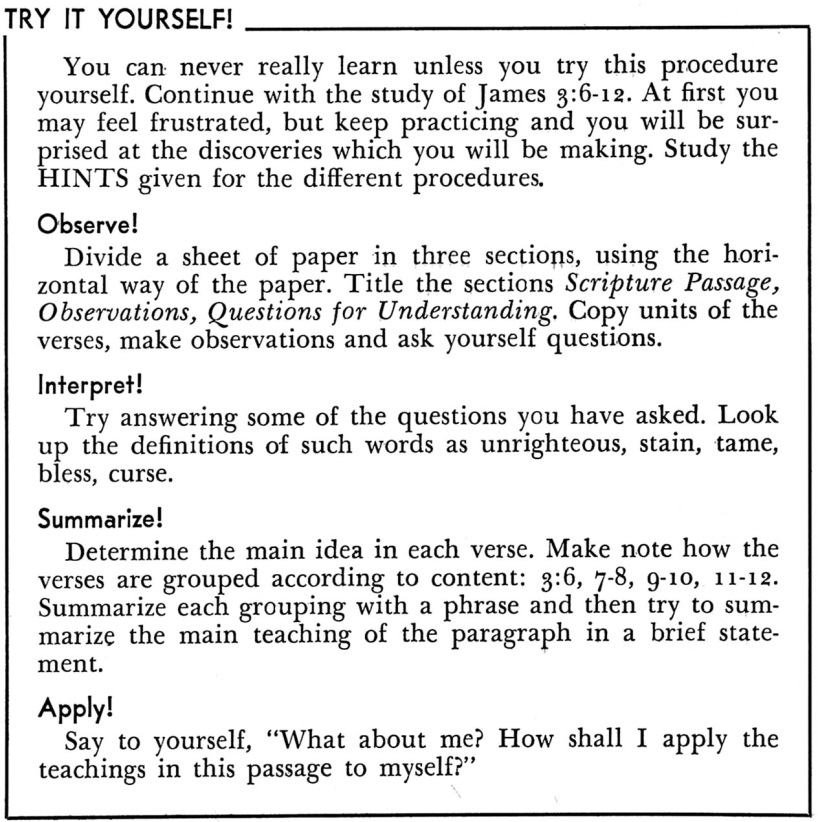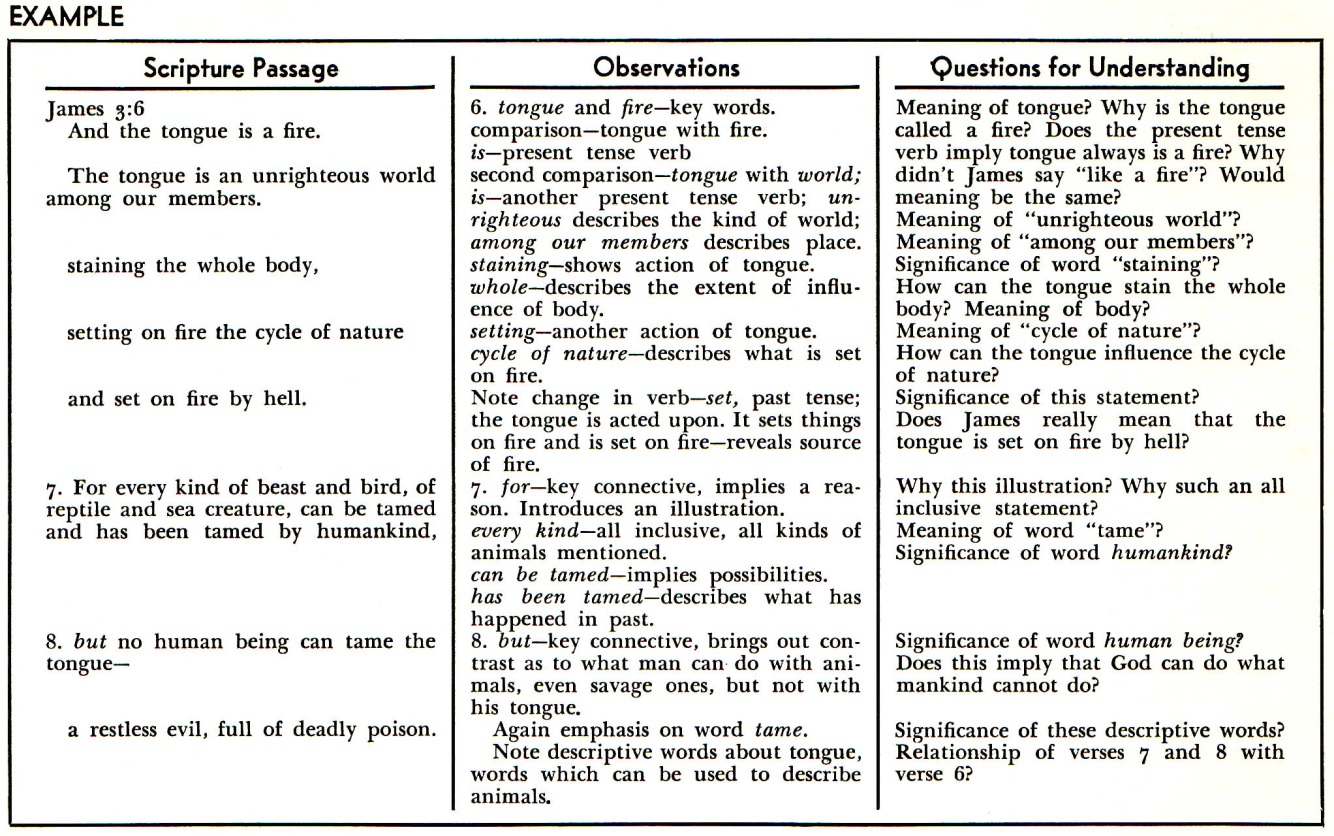
Methodical Principles
BEGINNING

Methodical Principles
BEGINNING
“I am to conduct a Bible study. How do I begin? What is the first thing I should do? What steps should I follow?”
Begin by Observing
Imagine that you have been invited to conduct a Bible study for some special occasion. You have never done this before. Or maybe you’ve conducted Bible studies but have felt the need for guidance in study procedure. You’ve wondered what to do and where to start.
First, you must learn how to observe – “Having eyes, can you see?”
Several times in His ministry, Jesus reprimanded His disciples with the words: “Having eyes do you see, and having ears do you not hear?” (Mark 8:18). This is a needed exhortation for all who seek to be students of the Bible. Someone has said that most of us suffer from “habit‑focus.” We see only what we are used to seeing.
The first skill a Bible student must master is training the mind to carefully observe the words in a Bible passage. Too many of us are in the habit of reading Scripture without really “seeing” anything or really thinking. We read words but do not observe what the words are saying. Sometimes we do not even see all the words in a passage. Because of inaccurate and careless observations, we often make faulty interpretations and applications.
What Is the Meaning and Purpose of Observation?
Observation may be defined in several ways: the act, power, or habit of seeing and noting; thorough and careful notice; to watch closely; to look intently; to give full attention to what one sees; to be mentally aware of what one sees.
Observation demands concentration
The purpose of observation is to thoroughly saturate yourself with the content of a passage. Like a sponge, absorb everything before you. You must learn to be exact and accurate in your observations. Not everything you see will be of equal value; therefore, in the process you must also learn to discern what is noteworthy and what is not. All of these procedures require concentration.
But To Learn How To Concentrate Is Difficult – test yourself
Open your Bible to the third chapter of James. Try to read the entire chapter without thinking about anything else. Could you do it? Or were you thinking about some other job you should do?
Because most of us are not very good at concentrating, we shall consider some practical procedures which should help increase your powers of concentration when studying the Bible.
Practical Steps When Studying the Bible
STEP ONE – Read the Word Prayerfully
We offer some practical procedures to follow when preparing a Bible study:
Even when studying the Bible for personal enrichment, you will find the procedure helpful. The purpose of these suggestions is to help the student discover Bible truths himself, and in the discovery, experience the joys and satisfaction that come with achievement.
Step One is to read the Scripture passage prayerfully with an open mind, receiving what God has to teach and which a humble heart is ready to obey. Imagine that the portion of Scripture you are to teach is James 3:6‑12. The following procedure will be helpful:
1. Pray that the Holy Spirit will guide your study
2. Read the whole book of James to get the setting of your particular portion
3. Read more carefully the portion you are to teach (For a better understanding of this study process we suggest that you actually read James 3:6‑12 before considering Step Two)
STEP TWO – observe thoughtfully
In Step One the Word is approached in a spirit of prayerful meditation. You may even spend some time praying about truths that have special meaning to you. In Step Two your attitude should be one of thoughtful contemplation. You want to see what the passage is saying and what it means.
You will read thoughtfully the first verse of your portion, James 3:6: “And the tongue is a fire. The tongue is an unrighteous world among our members, staining the whole body, setting on fire the cycle of nature, and set on fire by hell.”
As you observe the words of this verse you will note that James calls the tongue “a fire.” You note that he says some other things about the tongue; that it is “an unrighteous world.” As you look at the term “unrighteous world,” you may say to yourself, “What does he mean by that?” As you come to the next phrase, “among our members,” you also wonder about its meaning. There are other phrases you may not understand such as “cycle of nature” and “set on fire by hell.” By the time you have thoughtfully observed all of the parts of the verse, you may have more questions than observations of truths.
The procedure of puzzling about the meanings of words and phrases is a natural process of the mind. When a person begins to think concretely about a portion of writing, the normal action of the mind is to pick up key words and ideas and begin to question the meanings. The sad fact is that in studying the Bible, students often stop at that point, just as the mind begins to function. They see so many terms they don’t understand that they close their Bibles and say, “What’s the use!” They do not understand that the very process of questioning reveals that the mind is warming up, enabling the student to find solutions to the problems.
STEP THREE – observe deliberately
The questions you ask as you study may be called “questions for understanding” or “interpretive questions.” In your mind you are pondering about the interpretation (the meaning and significance) of words and phrases in the Scripture passage. You can continue your study of this section of James observing words and phrases and speculating about meanings in a rather hit and miss fashion or you can proceed in a logical and methodical pattern. Now that you understand the way your mind works, you should deliberately encourage it to concentrate on words and phrases, making yourself ask questions for understanding. The best way to study is to record on paper what you observe and question.
Take a sheet of paper and divide it into three sections. Use your paper horizontally to get sections as wide as possible. Title your sections as follows:

In the left section write down portions from the Scripture passage. It is best to copy parts of a verse at a time, rather than a whole verse, but always include a unit of words such as a phrase or clause that has a unified idea. In the center section write your observations. In the right section write your questions about meanings. Remember that the purpose for asking yourself questions is to help note areas that need special interpretation. You are trying to determine what the author meant by his words. “What did James mean when he said . . .?”
Note the example presented below. It is helpful to underline key words and phrases taken from Scripture. Therefore, words in the example that would be underlined are printed in italics.
Too Much Writing?
Wondering about the value of writing down your observations and questions? Possibly you are asking if it isn't enough just to make mental observations. Why write them on paper?
It is possible to read Scripture, mentally making observations and asking yourself questions about meanings, but writing requires more discipline in thought and concentration. Most of us are rather superficial in our thinking unless we force ourselves to write our thoughts on paper – “Writing maketh an exact man.”


General Suggestions for Study
Each writer of a book of the Bible had a specific purpose for writing what he did. He had certain truths he desired to convey. His purpose determined the content of his book, which truths to include and omit. His purpose also determined the structure of his book and the manner in which he arranged his material. His own personality and background influenced his literary style. Historical events and situations governed some of the content and approaches used by the author.
When a person studies any portion of Scripture, there are some major things to observe:
1. Purpose – What is the author’s primary purpose for writing this book or passage?
2. Content – What are the major truths presented in order to bring out his purpose?
3. Structure – How has he arranged his material to emphasize his purpose?
4. Literary form – What literary form does he use to bring out his message? Prose, poetry, discourse, parabolic, apocalyptic? When is the terminology literal and when is it figurative?
5. Atmosphere – What is the underlying tone of the passage?
Hints for Observing Content and Structure
Look for:
1. The key words and ideas the author emphasizes
2. The way he describes things
3. The way he arranges material
4. The verbs he uses and their tenses (present, past, future)
5. The contrasts, comparisons, illustrations he uses
6. The important connectives which bring out contrasts, comparisons and reasons (for, but, therefore, yet, etc.)
7. The advice he gives and promises he makes
Hints for Observing Literary Form and Atmosphere
Literary form is the type of writing an author uses to express his message. The major types which authors can use are found in Biblical literature. As you study a passage, observe the following types:
1. Discoursive literature – employed in the Epistles wherein ideas are presented in logical and argumentative form
2. Prose narrative – found in the historical books and the Gospels wherein historical events are often described in chronological order
3. Poetic literature – the type found in the psalms
4. Parabolic literature – such as the parables used by Jesus
5. Apocalyptic literature – characterized by symbolism and descriptions of visions such as found in book of Revelation
Also you need to discern whether the author is using literal or figurative terminology. A literal term is one that is to be considered according to its natural or usual meaning. A figurative term is symbolic in nature and must be interpreted accordingly. For instance, when Jesus said, “I am the living bread . . . if any man eat of this bread, he shall live forever” (John 6:51). He was using figurative language. The Jews who heard Him interpreted His words literally and asked, “How can the man give us his flesh to eat?” (John 6:52). So it is when you observe and interpret. Unless you observe and understand the nature of the terminology, you may be unfair to the author in your interpretation.
Hints for Asking Questions
The purpose of asking questions is to challenge yourself to think seriously about the meaning of the passage you are studying. There are many questions you can ask yourself but in the beginning concentrate on four basic questions:
1. Meanings – What does this word or phrase mean?
2. Implications – What is implied in the use of this term?
3. Significance – Why are these words used? What is their importance?
4. Relationship – How are the ideas related in the verses and paragraphs? What is the relation of one verse to another?
Hints for Interpreting
1. Use a dictionary and look up the meanings of key words
2. Compare translations and study cross‑references
3. Consult Bible dictionaries, commentaries and other resources
Hints for Summarizing a Passage
After studying details in a Bible passage, you should always summarize the major teachings. Try to state the major idea in one statement or phrase. List the key ideas supporting the major idea.
Hints for Applying the Truths
Say to yourself, “How does this apply to me?” – Truths to believe; Attitudes to change; Actions to take or avoid; Sins to confess and forsake; Examples to follow; Admonitions to heed; Promises to claim?